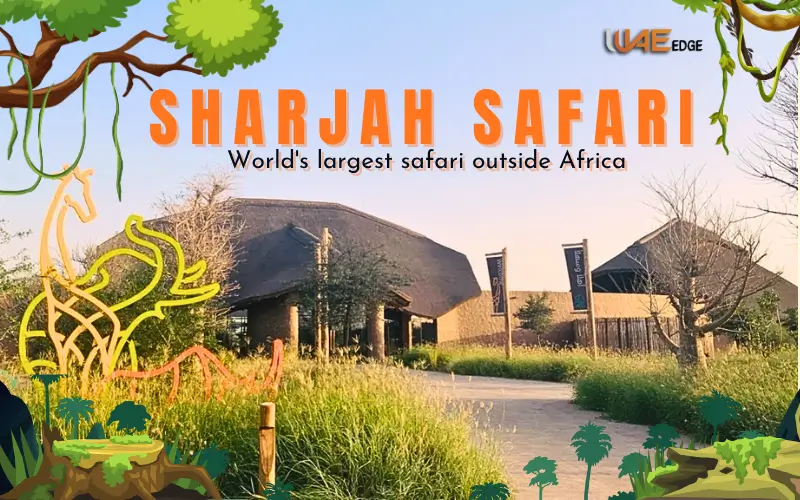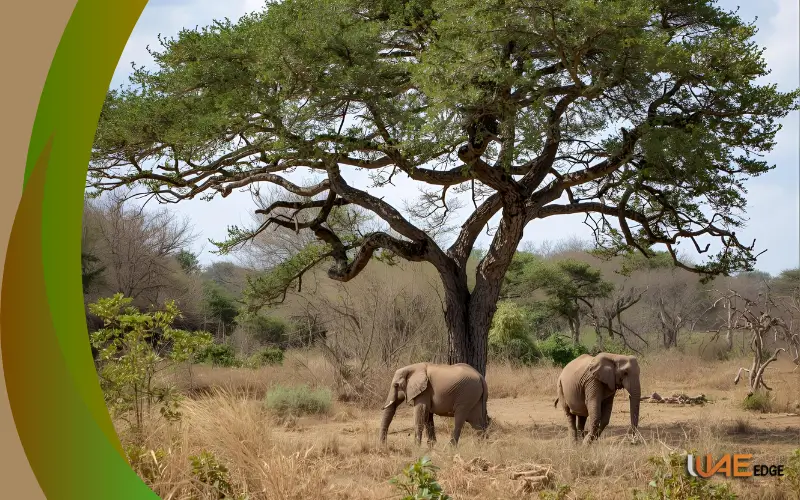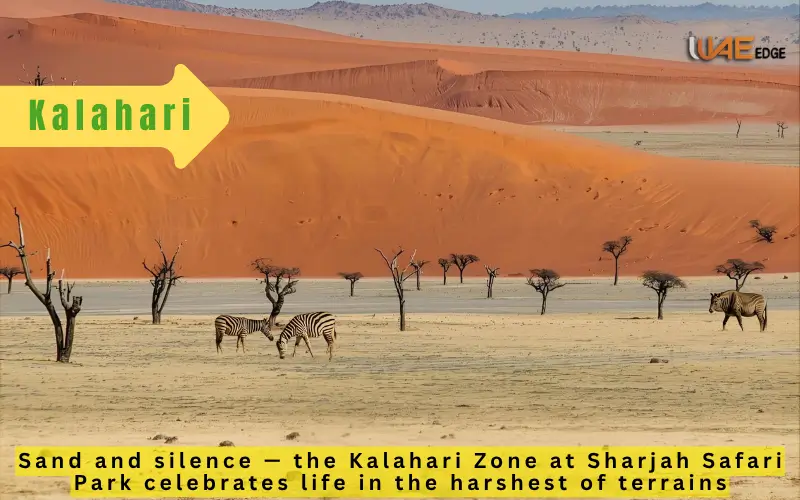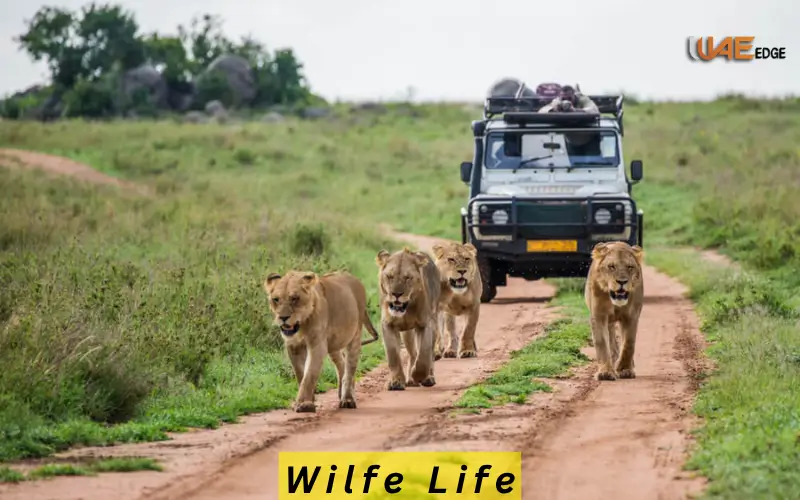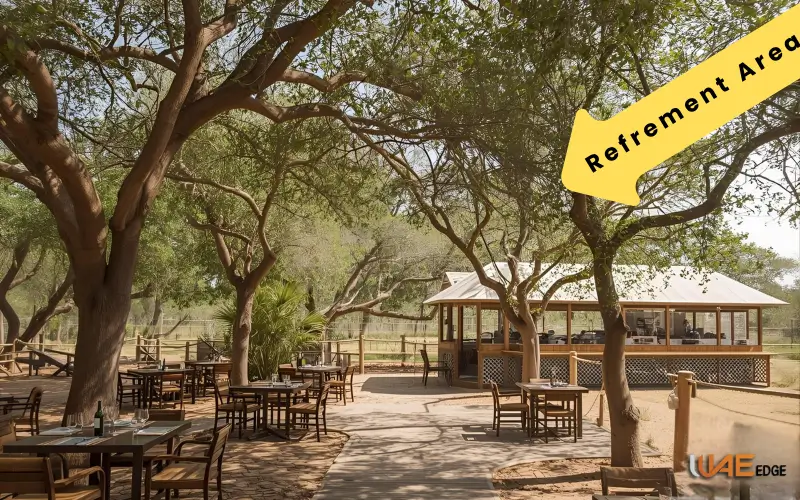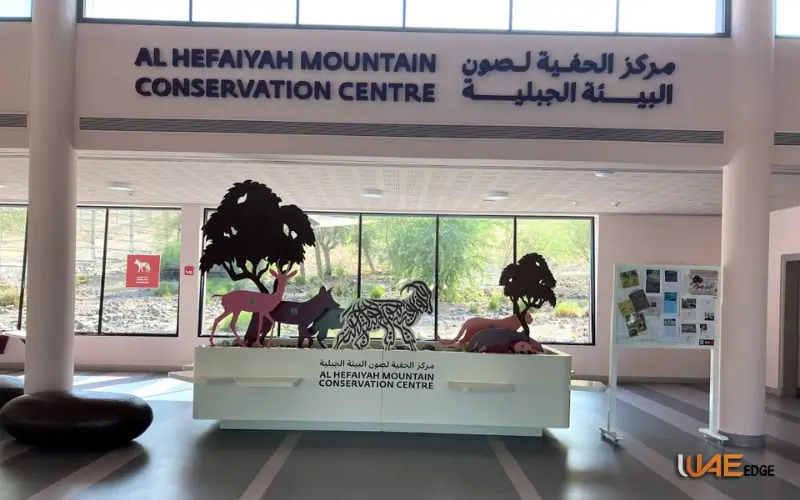Sharjah Safari Park is situated in the heart of the Al Bridi Nature Reserve, bordering Al Dhaid, and is one of the most impressive wildlife sites in the Middle East. This large park was officially opened in February 2022 and is located on 8 square kilometers making it the largest safari park in Africa.
The project is an indication of the Emirate of Sharjah in its strong dedication towards wildlife conservation, education and sustainable tourism. Tourists can experience a real African-style safari – and not even travel out of the UAE.
Sharjah Safari Park Introduction
Overview and Significance
Sharjah Safari is not a simple zoo, but an ecotourist park. The park was developed under the concept of His Highness Sheikh Dr. Sultan bin Muhammad Al Qasimi with the intention of integrating environmental protection and culture into this development. The idea is aimed at representing the African continent’s landscapes and the diversity of wildlife that can be seen on the territory of the continent – the green and savannah-like areas and the deserts.
The park contains over 120 species of animals, which is a learning experience that helps the visitor learn about biodiversity, the need to preserve the habitat, and the interrelations between humans and nature.
Location and Accessibility
Sharjah Safari is found at Al Bridi Nature Reserve which is near Al Dhaid and is around:
- 45 minutes from Sharjah City
- 60 minutes from Dubai
- Accessible through the Al Dhaid Road (E88).
The park is surrounded by desert scenery with acacia trees, which will fit very well into the overall vision of eco-tourism in Sharjah.
Inauguration and Management
Several years of ecological research and construction saw the opening of the park on February 17, 2022. It is controlled by the Environment and Protected Areas Authority (EPAA) of Sharjah. The project has hundreds of domestic and global wildlife specialists, veterinarians and conservationists.
Sharjah Safari Concept and Design
Architectural Inspiration
The Sharjah Safari Park is a living replica of the ecosystem in Africa. Large open environments are provided instead of cages so that the animals roam freely in their natural habitats. In order to create an authentic African environment, artificial lakes, savannah-like lawns, and acacia groves were created.
The design is a mixture of 12 themed zones representing a part of Africa blending architectural beauty, plants, and climate design.
Thematic African Zones
All 12 themed zones represent the specific biodiversity of African popular landscapes. These include:
Sahel
A semi-arid grassland area that symbolizes the desert savannah transition. It is inhabited by antelopes, gazelles, and ostriches.
Savannah
The most recognizable African environment is giraffes, zebras, and lions that inhabit enormous plain areas.
Kalahari
One of its ecosystems is a desert ecosystem inspired by the southern African region with an exposition of desert foxes and tough plant life.
Serengeti
The Serengeti region enables the tourist to observe the predator and prey relationship among the lions, wildebeests, and other grazers.
Moremi and Ngorongoro
These areas reproduce wetlands and crater sceneries, which include flamingos, hippos, and crocodiles.
Madagascar
There is a rare island ecosystem of lemurs, tropical birds, and exotic plants.
All the zones include a guided tour by experts in the field of safari, which helps the visitors get to know the ecological balance of the African wildlife.
Sustainability and Design
The park has integrated environmentally friendly architecture, which encompasses:
- Solar-powered energy systems.
- Sophisticated irrigation with recycled water.
- Construction materials are sourced locally.
- Reduction of manmade obstacles.
The mission of Sharjah Safari is to offer people a natural experience and, at the same time, protect the local and African biodiversity.
Wildlife and Diversity of Species
Animal Population
Sharjah Safari is also home to thousands of animals (more than 120 species) of the African continent. This consists of herbivores and carnivores, as well as birds, reptiles, and amphibians.
Big Five
The most typical African animals are the Big Five that can be seen by the visitors:
Lions -The noble monarchs of the savannah.
Leopards – vicious creatures of the wild.
African Elephants– the docile giants that can be found in herds.
Rhinos – The white as well as black rhinos are safeguarded here.
Buffaloes– Herd animals, which represent the African wilderness.
Other Animals
Besides the Big Five, the safari park contains:
- Giraffes – The feeding areas give close interactions.
- Zebras and Antelopes – gracefully passing over the plains.
- Cheetahs and Hyenas – These are spotted in observed safe viewing fields.
- Flamingos, Pelicans, Ostriches -In special bird pens.
- Reptiles and Amphibians – The reptiles and amphibians were monitored under temperature-controlled conditions.
Breeding and Conservation Programs
Sharjah Safari is an active participant in the conservation of endangered species. It works with the World Wildlife Fund to:
- Conserve the endangered species.
- Carry out breeding activities in regulated conditions.
- Revive and restore injured animals.
- Local conservationists and veterinarians should be trained.
Efforts by the park to be successful at breeding have yielded African antelopes, ostriches, and various rare birds.
Visitor Experience and Attractions
Safari Tour Types
The park has three safari tour packages of varying sophistication and comfort:
Bronze Tour
- A stroll through some areas of choice (2-3 hours).
- Guided by expert rangers.
- Perfect families or first-time visitors.
Silver Tour
- 5-6-hour bus/shared vehicle safari.
- Captures the major part of the ecosystems in the park.
- Stops at key points of view and photo areas.
Gold Tour
- Premium experience in a personal luxury car.
- Personal safari guide and off-road route.
- Special drinks and individual photo shooting.
Key Attractions
Sharjah Safari Park has other experiences other than observing animals:
- Giraffe Feeding Decks: Secure areas where the visitors can feed giraffes.
- Lion and Elephant Viewing Points: Vantage points for viewing the predators and giant mammals.
- Bird Sanctuary: This is a walk-through aviary that contains hundreds of tropical birds.
- Waterhole Scenes: man-made lakes into which animals flock of their own choice to drink and bathe.
- Educational Programs: Rangers and wildlife specialists talk.
Adventure and Photography
It is the park that promotes responsible photography:
- The optimum light is in the early morning and late afternoon safaris.
- Photo stops are used to make sure that the visitors are safe.
- Tour packages can be offered with professional photographers
Facilities
Families with kids can enjoy:
- The Welcome has exhibits on interacting with animals.
- Playgrounds that look like animals.
- School visit programs for environmental education.
Ticket Information and Pricing
Ticket Categories
| Ticket Type | Description | Duration | Adults | Children (3–12 years) |
| Bronze | Walking tour with a ranger | 2–3 hours | AED 40 | AED 15 |
| Silver | Guided safari in a shared vehicle | 5–6 hours | AED 120 | AED 50 |
| Gold | Private luxury tour + guide | 5–6 hours | AED 275 | AED 120 |
Tickets can be booked online via the official website or at the park’s entrance. Group and school discounts are also available.
Timings
- Open daily: 8:30 AM – 6:30 PM
- Last entry for Silver/Gold: 2:00 PM
- Last entry for Bronze: 4:00 PM
During Ramadan and summer, timings may vary slightly.
Best Time to Visit
The ideal period to visit Sharjah Safari Park is from October to April, when the weather is pleasant. Mornings (8:30 AM – 11:00 AM) are perfect for viewing active wildlife.
🐘 Park Timings and Best Visiting Hours
| Season | Opening Hours | Last Entry (Silver/Gold) | Last Entry (Bronze) | Recommended Visit Time |
| Winter (Oct–Apr) | 8:30 AM – 6:30 PM | 2:00 PM | 4:00 PM | Morning (8:30 AM – 11:30 AM) |
| Summer (May–Sep) | 8:00 AM – 6:00 PM | 1:30 PM | 3:30 PM | Early Morning |
| Ramadan | 9:00 AM – 4:00 PM | 1:00 PM | 2:30 PM | Before Noon |
Facilities and Services
Dining Options
Sharjah Safari has various cafes and restaurants that provide international food as well as an African menu. Also available are shaded picnic grounds and food kiosks which serve refreshments during the safari breaks.
Visitor Amenities
- Air-conditioned rest areas
- Washrooms and prayer rooms
- African souvenir stores.
- Free parking zones
- Wheelchair and stroller rental.
Accessibility
The safari is meant to suit all visitors regardless of their abilities:
- Wheelchair-accessible paths
- Ramps and broad seeing platforms.
- Guest services for the elderly.
Internal Transportation
The visitors can move around using:
- Eco-friendly electric buses
- Gold category Private safari vehicles.
- Strolling paths in certain areas.
Environmental Commitment and Sustainability
The use of green energy has been shown to contribute to environmental sustainability and the reduction of pollution and waste effects affecting the environment. Green energy has been found to help in sustaining the environment and curbing the impacts of pollution and waste that impact the environment. The construction of Sharjah Safari Park is based on sustainability:
- Facilities are supplied with electricity by solar panels.
- The systems of water recycling irrigate plants and fill artificial lakes.
- The native vegetation lowers the need for irrigation and maintains ecological balance.
Wildlife Rehabilitation and Rescue
It has a Veterinary and Wildlife Rescue Center in the park. Crippled or rescued animals receive medical care before being released into the safe areas.
Local Employment and Education
The project has hundreds of UAE residents, and offers programs of educating about wildlife to local schools, which is an initiative to create ecological awareness among the young population of Sharjah.
Educational and Research Programs.
School Visits and Workshops
The UAE schools tend to go on a field trip to the park. Students participate in:
- Animal care demonstrations
- Interactive learning sessions.
- Ecological storytelling by the rangers.
Research Collaborations
Sharjah Safari collaborates with universities and research institutions to conduct research:
- Animal behavior
- Habitat preservation
- Desert ecology
- African species climatic adaptation.
Public Events
The park also has photography competitions, conservation awareness fests, and family festivals, which honor biodiversity and sustainability.
Sharjah Safari Park
From Sharjah City
Follow the Al Dhaid Road (E88) in the east direction for about 45-50 minutes. There is clear signage on the entrance to the safari at the Al Bridi Reserve.
From Dubai
Drive through E611 or E88 and proceed in approximately 60 minutes.
Taxi and ride-hailing apps (Careem, Uber) can be used to take a ride to the park.
Public Transport
Nowadays, there exists a small number of direct buses to Al Dhaid. The visitors should use their own cars or a taxi service in order to be more convenient.
🌍 How to Reach Sharjah Safari Park
| Starting Point | Route | Travel Time | Transport Options |
| Sharjah City | Al Dhaid Road (E88) | 45–50 minutes | Car, Taxi |
| Dubai | E611 → E88 | 60–70 minutes | Car, Uber, Careem |
| Ajman | E88 | 40 minutes | Taxi or private car |
| Public Transport | Limited direct buses to Al Dhaid | N/A | Use taxi from bus terminal |
Nearby Attractions
Al Dhaid Fort
An old fort within 15 minutes of the park, and representing Emirati architecture.
Mleiha Archaeological Centre
A heritage site in the desert where you tour the fossils and have a desert safari.
Sharjah Desert Park
A different wildlife park that targets Arabian animals, also situated in the emirate.
Al Hefaiyah Mountain Conservation Centre
A mountain conservation initiative of the native animals, such as the Arabian leopards and foxes.
Visitor Tips and Guidelines
What to Wear
- Light, breathable clothing
- Comfortable walking shoes
- Sun hat and sunglasses
What to Bring
- Water bottles and sunscreen
- Camera or binoculars
- Legitimate ID to buy tickets.
Rules to Follow
- No animals to be fed or touched without any supervision.
- Remain in cars in areas that lack walking.
- Flash photography and drones are forbidden.
Safety and Etiquette
During the safari, rangers are available. All visitors have to abide by all the safety guidelines to guarantee the safety of humans and animals.
Tourism Vision of Sharjah Safari in the UAE
Contribution to Eco-Tourism of Sharjah
The safari is a component of Sharjah Vision 2040 whose key concern is sustainable tourism and environmental consciousness. Thousands of visitors come every year, which positively affects the image of the emirate as a green destination in the world.
Economic and Educational Impact
The project enhances employment in the region, advances education, and is a contributor to the goals of cultural and environmental development of Sharjah.
Awards and Recognition
Sharjah Safari has been identified by the local tourism bodies due to its planning, conservation efforts, and satisfaction of visitors.
Future Developments
Expansion Plans
Upcoming phases include:
- New homes for the nocturnal animals.
- Specific areas of reptiles and amphibians.
- Refined safari vehicles and guide application.
Integration with Other Projects
Wasit Wetland Centre and Kalba Eco-Reserve will be linked to the park, creating a single eco-tourism route in Sharjah.
Technological Innovations
A system of smart ticketing, animal tracking smart (augmented reality, or AR), and interactive digital maps is under development to improve the visitor experience.
Conclusion
The Sharjah Safari Park represents the UAE values of sustainability, education, and protection of wildlife. It is the biggest safari park outside Africa, and a lifetime experience for the visitors, being able to explore various habitats and view magnificent animals in almost natural environments.
The mixture of ecological design, cultural sensitivity and entertainment makes the park an obligatory must-see place both to residents and tourists. A family in need of adventure, a student learning about biodiversity, or a photographer in search of African sunsets, to name a few, Sharjah Safari Park is the place to be.
Frequently asked questions of Sharjah Safari Park
Q1: What is the location of Sharjah Safari Park?
A: It is situated in Al Bridi nature reserve in Al Dhaid Sharjah.
Q2: When does the park open?
A: The park is open all day long, with the hours between 8:30 AM and 6:30 PM.
Q3: What animals can I see there?
A: There are more than 120 species that can be observed such as lions, giraffes, rhinos, elephants, and flamingos.
Q4: Are there dining options?
A: Yes, several restaurants and cafes offer local and international food.
Q5: Is it suitable for children?
A: Absolutely! The park provides entertainment and a learning experience to the children.
Q6: Can I drive my car inside?
A: No, it is only the official safari vehicles that are permitted within the tour zones.
Q7: Are pets allowed?
A: Pets are seriously forbidden.
Q8: What is the amount of time that I should schedule the visit?
A: Schedule about 4 to 6 hours to have a complete safari time.
Related Blog : Sharjah Muroor Traffic Department of Visitors and Residents



